Safe iterator wrapper. More...
#include <safe_sequence.h>
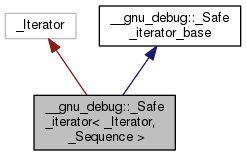
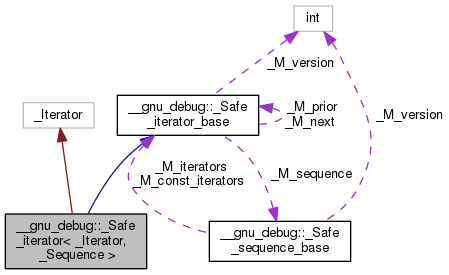
Classes | |
| struct | _Attach_single |
Public Types | |
| typedef _Traits::difference_type | difference_type |
| typedef _Traits::iterator_category | iterator_category |
| typedef _Iterator | iterator_type |
| typedef _Traits::pointer | pointer |
| typedef _Traits::reference | reference |
| typedef _Traits::value_type | value_type |
Public Member Functions | |
| _Safe_iterator () _GLIBCXX_NOEXCEPT | |
| _Safe_iterator (const _Iterator &__i, const _Safe_sequence_base *__seq) _GLIBCXX_NOEXCEPT | |
| Safe iterator construction from an unsafe iterator and its sequence. More... | |
| _Safe_iterator (const _Safe_iterator &__x) _GLIBCXX_NOEXCEPT | |
| Copy construction. More... | |
| template<typename _MutableIterator > | |
| _Safe_iterator (const _Safe_iterator< _MutableIterator, typename __gnu_cxx::__enable_if<(std::__are_same< _MutableIterator, typename _Sequence::iterator::iterator_type >::__value), _Sequence >::__type > &__x) _GLIBCXX_NOEXCEPT | |
| Converting constructor from a mutable iterator to a constant iterator. More... | |
| void | _M_attach (_Safe_sequence_base *__seq, bool __constant) |
| Attaches this iterator to the given sequence, detaching it from whatever sequence it was attached to originally. More... | |
| void | _M_attach (_Safe_sequence_base *__seq) |
| Attach iterator to the given sequence. More... | |
| void | _M_attach_single (_Safe_sequence_base *__seq, bool __constant) throw () |
| Likewise, but not thread-safe. More... | |
| void | _M_attach_single (_Safe_sequence_base *__seq) |
| Likewise, but not thread-safe. More... | |
| bool | _M_attached_to (const _Safe_sequence_base *__seq) const |
| Determines if we are attached to the given sequence. More... | |
| bool | _M_before_dereferenceable () const |
| Is the iterator before a dereferenceable one? More... | |
| bool | _M_can_advance (const difference_type &__n) const |
| _GLIBCXX_PURE bool | _M_can_compare (const _Safe_iterator_base &__x) const throw () |
Can we compare this iterator to the given iterator __x? Returns true if both iterators are nonsingular and reference the same sequence. More... | |
| bool | _M_decrementable () const |
| bool | _M_dereferenceable () const |
| Is the iterator dereferenceable? More... | |
| void | _M_detach () |
| Detach the iterator for whatever sequence it is attached to, if any. More... | |
| void | _M_detach_single () throw () |
| Likewise, but not thread-safe. More... | |
| __gnu_cxx::__conditional_type< std::__are_same< _Const_iterator, _Safe_iterator >::__value, const _Sequence *, _Sequence * >::__type | _M_get_sequence () const |
| bool | _M_incrementable () const |
| Is the iterator incrementable? More... | |
| void | _M_invalidate () |
| Invalidate the iterator, making it singular. More... | |
| bool | _M_is_before_begin () const |
| Is this iterator equal to the sequence's before_begin() iterator if any? More... | |
| bool | _M_is_begin () const |
| Is this iterator equal to the sequence's begin() iterator? More... | |
| bool | _M_is_beginnest () const |
| Is this iterator equal to the sequence's before_begin() iterator if any or begin() otherwise? More... | |
| bool | _M_is_end () const |
| Is this iterator equal to the sequence's end() iterator? More... | |
| void | _M_reset () throw () |
| Reset all member variables. More... | |
| _GLIBCXX_PURE bool | _M_singular () const throw () |
| Is this iterator singular? More... | |
| void | _M_unlink () throw () |
| Unlink itself. More... | |
| bool | _M_valid_range (const _Safe_iterator &__rhs) const |
| _Iterator & | base () _GLIBCXX_NOEXCEPT |
| Return the underlying iterator. More... | |
| const _Iterator & | base () const _GLIBCXX_NOEXCEPT |
| operator _Iterator () const _GLIBCXX_NOEXCEPT | |
| Conversion to underlying non-debug iterator to allow better interaction with non-debug containers. More... | |
| reference | operator* () const _GLIBCXX_NOEXCEPT |
| Iterator dereference. More... | |
| _Safe_iterator | operator+ (const difference_type &__n) const _GLIBCXX_NOEXCEPT |
| _Safe_iterator & | operator++ () _GLIBCXX_NOEXCEPT |
| Iterator preincrement. More... | |
| _Safe_iterator | operator++ (int) _GLIBCXX_NOEXCEPT |
| Iterator postincrement. More... | |
| _Safe_iterator & | operator+= (const difference_type &__n) _GLIBCXX_NOEXCEPT |
| _Safe_iterator | operator- (const difference_type &__n) const _GLIBCXX_NOEXCEPT |
| _Safe_iterator & | operator-- () _GLIBCXX_NOEXCEPT |
| Iterator predecrement. More... | |
| _Safe_iterator | operator-- (int) _GLIBCXX_NOEXCEPT |
| Iterator postdecrement. More... | |
| _Safe_iterator & | operator-= (const difference_type &__n) _GLIBCXX_NOEXCEPT |
| pointer | operator-> () const _GLIBCXX_NOEXCEPT |
| Iterator dereference. More... | |
| _Safe_iterator & | operator= (const _Safe_iterator &__x) _GLIBCXX_NOEXCEPT |
| Copy assignment. More... | |
| reference | operator[] (const difference_type &__n) const _GLIBCXX_NOEXCEPT |
Public Attributes | |
| _Safe_iterator_base * | _M_next |
| Pointer to the next iterator in the sequence's list of iterators. More... | |
| _Safe_iterator_base * | _M_prior |
| Pointer to the previous iterator in the sequence's list of iterators. More... | |
| _Safe_sequence_base * | _M_sequence |
| The sequence this iterator references; may be NULL to indicate a singular iterator. More... | |
| unsigned int | _M_version |
| The version number of this iterator. More... | |
Protected Member Functions | |
| __gnu_cxx::__mutex & | _M_get_mutex () throw () |
| For use in _Safe_iterator. More... | |
Private Types | |
| typedef _Sequence::const_iterator | _Const_iterator |
| typedef _Iterator | _Iter_base |
| typedef _Safe_iterator_base | _Safe_base |
| typedef std::iterator_traits< _Iterator > | _Traits |
Private Member Functions | |
| _Safe_iterator (const _Iterator &__i, _Safe_sequence_base *__seq, _Attach_single) _GLIBCXX_NOEXCEPT | |
| bool | _M_constant () const |
| Determine if this is a constant iterator. More... | |
Safe iterator wrapper.
The class template _Safe_iterator is a wrapper around an iterator that tracks the iterator's movement among sequences and checks that operations performed on the "safe" iterator are legal. In additional to the basic iterator operations (which are validated, and then passed to the underlying iterator), _Safe_iterator has member functions for iterator invalidation, attaching/detaching the iterator from sequences, and querying the iterator's state.
Note that _Iterator must be the first base class so that it gets initialized before the iterator is being attached to the container's list of iterators and it is being detached before _Iterator get destroyed. Otherwise it would result in a data race.
|
private |
|
private |
|
private |
|
private |
| typedef _Traits::difference_type __gnu_debug::_Safe_iterator< _Iterator, _Sequence >::difference_type |
| typedef _Traits::iterator_category __gnu_debug::_Safe_iterator< _Iterator, _Sequence >::iterator_category |
| typedef _Iterator __gnu_debug::_Safe_iterator< _Iterator, _Sequence >::iterator_type |
| typedef _Traits::pointer __gnu_debug::_Safe_iterator< _Iterator, _Sequence >::pointer |
| typedef _Traits::reference __gnu_debug::_Safe_iterator< _Iterator, _Sequence >::reference |
| typedef _Traits::value_type __gnu_debug::_Safe_iterator< _Iterator, _Sequence >::value_type |
|
inlineprivate |
References __gnu_debug::_Safe_iterator< _Iterator, _Sequence >::_M_attach_single().

|
inline |
Referenced by __gnu_debug::_Safe_iterator< _Iterator, _Sequence >::operator+(), __gnu_debug::_Safe_iterator< _Iterator, _Sequence >::operator++(), __gnu_debug::_Safe_iterator< _Iterator, _Sequence >::operator-(), and __gnu_debug::_Safe_iterator< _Iterator, _Sequence >::operator--().
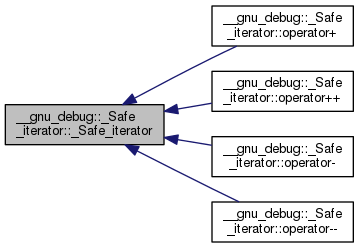
|
inline |
Safe iterator construction from an unsafe iterator and its sequence.
seq is not NULL References __gnu_debug::__msg_init_singular, _GLIBCXX_DEBUG_VERIFY, and __gnu_debug::_Safe_iterator_base::_M_singular().

|
inline |
Copy construction.
References __gnu_debug::__msg_init_copy_singular, _GLIBCXX_DEBUG_VERIFY, and __gnu_debug::_Safe_iterator< _Iterator, _Sequence >::_M_attach().

|
inline |
Converting constructor from a mutable iterator to a constant iterator.
References __gnu_debug::__msg_init_const_singular, _GLIBCXX_DEBUG_VERIFY, and __gnu_debug::_Safe_iterator< _Iterator, _Sequence >::_M_attach().

|
inherited |
Attaches this iterator to the given sequence, detaching it from whatever sequence it was attached to originally.
If the new sequence is the NULL pointer, the iterator is left unattached.
Referenced by __gnu_debug::_Safe_iterator< _Iterator, _Sequence >::_M_attach(), and __gnu_debug::_Safe_iterator_base::_Safe_iterator_base().

|
inline |
Attach iterator to the given sequence.
References __gnu_debug::_Safe_iterator_base::_M_attach(), and __gnu_debug::_Safe_iterator< _Iterator, _Sequence >::_M_constant().
Referenced by __gnu_debug::_Safe_iterator< _Iterator, _Sequence >::_Safe_iterator(), and __gnu_debug::_Safe_iterator< _Iterator, _Sequence >::operator=().


|
inherited | ||||||||||||||||||||
Likewise, but not thread-safe.
Referenced by __gnu_debug::_Safe_iterator< _Iterator, _Sequence >::_M_attach_single().

|
inline |
Likewise, but not thread-safe.
References __gnu_debug::_Safe_iterator_base::_M_attach_single(), and __gnu_debug::_Safe_iterator< _Iterator, _Sequence >::_M_constant().
Referenced by __gnu_debug::_Safe_iterator< _Iterator, _Sequence >::_Safe_iterator().


|
inlineinherited |
Determines if we are attached to the given sequence.
|
inline |
Is the iterator before a dereferenceable one?
References __gnu_debug::__base(), __gnu_debug::_Safe_iterator< _Iterator, _Sequence >::_M_get_sequence(), __gnu_debug::_Safe_iterator< _Iterator, _Sequence >::_M_incrementable(), and __gnu_debug::_Safe_iterator< _Iterator, _Sequence >::base().

| bool __gnu_debug::_Safe_iterator< _Iterator, _Sequence >::_M_can_advance | ( | const difference_type & | __n | ) | const |
Referenced by __gnu_debug::_Safe_iterator< _Iterator, _Sequence >::operator+(), __gnu_debug::_Safe_iterator< _Iterator, _Sequence >::operator+=(), __gnu_debug::_Safe_iterator< _Iterator, _Sequence >::operator-(), __gnu_debug::_Safe_iterator< _Iterator, _Sequence >::operator-=(), and __gnu_debug::_Safe_iterator< _Iterator, _Sequence >::operator[]().
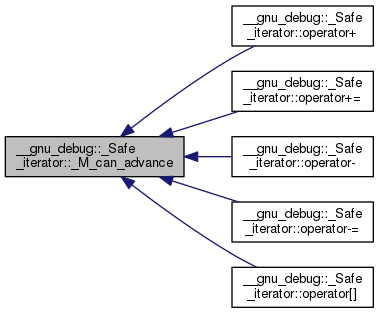
|
inherited | ||||||||||||||
Can we compare this iterator to the given iterator __x? Returns true if both iterators are nonsingular and reference the same sequence.
|
inlineprivate |
Determine if this is a constant iterator.
Referenced by __gnu_debug::_Safe_iterator< _Iterator, _Sequence >::_M_attach(), and __gnu_debug::_Safe_iterator< _Iterator, _Sequence >::_M_attach_single().
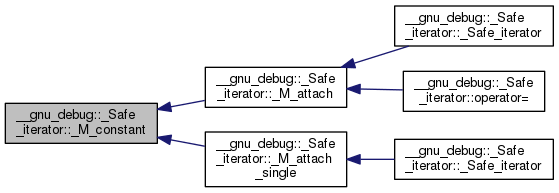
|
inline |
References __gnu_debug::_Safe_iterator< _Iterator, _Sequence >::_M_is_begin(), and __gnu_debug::_Safe_iterator_base::_M_singular().
Referenced by __gnu_debug::_Safe_iterator< _Iterator, _Sequence >::operator--().


|
inline |
Is the iterator dereferenceable?
References __gnu_debug::_Safe_iterator< _Iterator, _Sequence >::_M_is_before_begin(), __gnu_debug::_Safe_iterator< _Iterator, _Sequence >::_M_is_end(), and __gnu_debug::_Safe_iterator_base::_M_singular().
Referenced by __gnu_debug::__check_dereferenceable(), __gnu_debug::_Safe_iterator< _Iterator, _Sequence >::operator*(), and __gnu_debug::_Safe_iterator< _Iterator, _Sequence >::operator->().

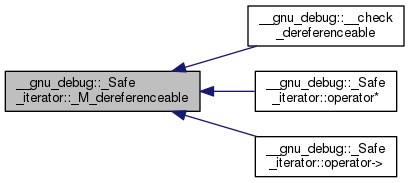
|
inherited |
Detach the iterator for whatever sequence it is attached to, if any.
Referenced by __gnu_debug::_Safe_iterator< _Iterator, _Sequence >::operator=(), and __gnu_debug::_Safe_iterator_base::~_Safe_iterator_base().
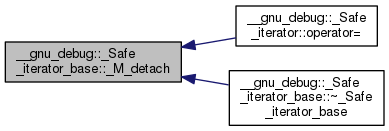
|
inherited | |||||||||||||
Likewise, but not thread-safe.
|
protectedinherited | |||||||||||||
For use in _Safe_iterator.
Referenced by __gnu_debug::_Safe_local_iterator< _Iterator, _Sequence >::operator++(), __gnu_debug::_Safe_iterator< _Iterator, _Sequence >::operator++(), __gnu_debug::_Safe_iterator< _Iterator, _Sequence >::operator+=(), __gnu_debug::_Safe_iterator< _Iterator, _Sequence >::operator--(), __gnu_debug::_Safe_iterator< _Iterator, _Sequence >::operator-=(), __gnu_debug::_Safe_local_iterator< _Iterator, _Sequence >::operator=(), and __gnu_debug::_Safe_iterator< _Iterator, _Sequence >::operator=().
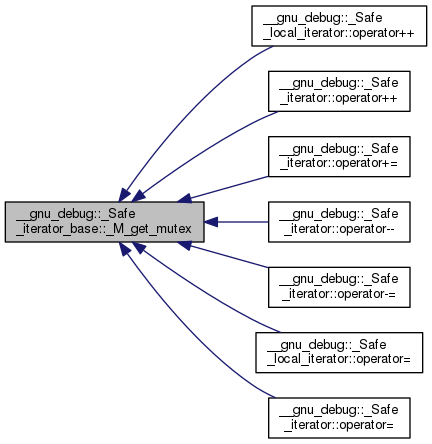
|
inline |
References __gnu_debug::_Safe_iterator_base::_M_sequence.
Referenced by __gnu_debug::__foreign_iterator_aux2(), __gnu_debug::__foreign_iterator_aux3(), __gnu_debug::__foreign_iterator_aux4(), __gnu_debug::_Safe_iterator< _Iterator, _Sequence >::_M_before_dereferenceable(), __gnu_debug::_Safe_iterator< _Iterator, _Sequence >::_M_is_begin(), __gnu_debug::_Safe_iterator< _Iterator, _Sequence >::_M_is_end(), __gnu_debug::_Error_formatter::_Parameter::_Parameter(), and __gnu_debug::_BeforeBeginHelper< _Sequence >::_S_Is_Beginnest().
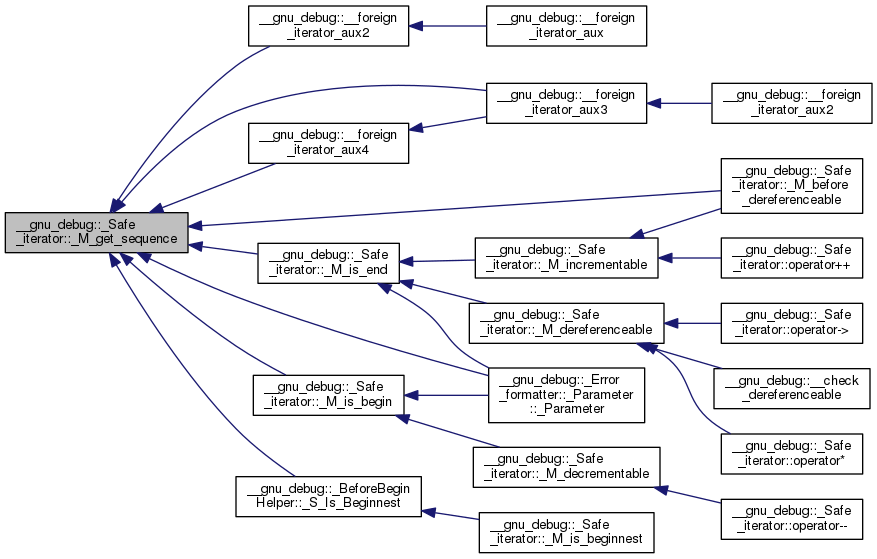
|
inline |
Is the iterator incrementable?
References __gnu_debug::_Safe_iterator< _Iterator, _Sequence >::_M_is_end(), and __gnu_debug::_Safe_iterator_base::_M_singular().
Referenced by __gnu_debug::_Safe_iterator< _Iterator, _Sequence >::_M_before_dereferenceable(), and __gnu_debug::_Safe_iterator< _Iterator, _Sequence >::operator++().

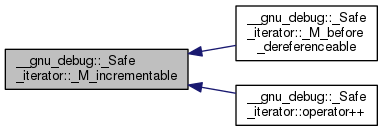
|
inlineinherited |
Invalidate the iterator, making it singular.
|
inline |
Is this iterator equal to the sequence's before_begin() iterator if any?
References __gnu_debug::_BeforeBeginHelper< _Sequence >::_S_Is().
Referenced by __gnu_debug::_Safe_iterator< _Iterator, _Sequence >::_M_dereferenceable(), and __gnu_debug::_Error_formatter::_Parameter::_Parameter().


|
inline |
Is this iterator equal to the sequence's begin() iterator?
References __gnu_debug::_Safe_iterator< _Iterator, _Sequence >::_M_get_sequence(), and __gnu_debug::_Safe_iterator< _Iterator, _Sequence >::base().
Referenced by __gnu_debug::_Safe_iterator< _Iterator, _Sequence >::_M_decrementable(), and __gnu_debug::_Error_formatter::_Parameter::_Parameter().


|
inline |
Is this iterator equal to the sequence's before_begin() iterator if any or begin() otherwise?
References __gnu_debug::_BeforeBeginHelper< _Sequence >::_S_Is_Beginnest().

|
inline |
Is this iterator equal to the sequence's end() iterator?
References __gnu_debug::_Safe_iterator< _Iterator, _Sequence >::_M_get_sequence(), and __gnu_debug::_Safe_iterator< _Iterator, _Sequence >::base().
Referenced by __gnu_debug::_Safe_iterator< _Iterator, _Sequence >::_M_dereferenceable(), __gnu_debug::_Safe_iterator< _Iterator, _Sequence >::_M_incrementable(), and __gnu_debug::_Error_formatter::_Parameter::_Parameter().

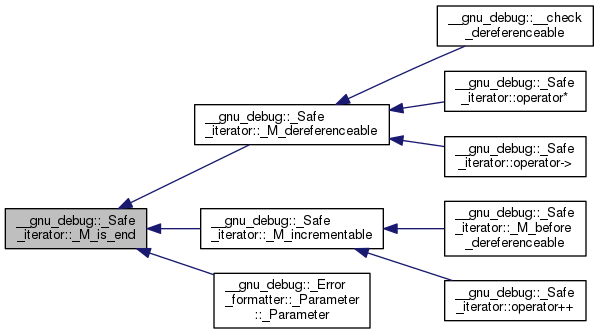
|
inherited | |||||||||||||
Reset all member variables.
|
inherited | |||||||||||||
Is this iterator singular?
Referenced by __gnu_debug::__check_singular_aux(), __gnu_debug::_Safe_iterator< _Iterator, _Sequence >::_M_decrementable(), __gnu_debug::_Safe_local_iterator< _Iterator, _Sequence >::_M_dereferenceable(), __gnu_debug::_Safe_iterator< _Iterator, _Sequence >::_M_dereferenceable(), __gnu_debug::_Safe_local_iterator< _Iterator, _Sequence >::_M_incrementable(), __gnu_debug::_Safe_iterator< _Iterator, _Sequence >::_M_incrementable(), __gnu_debug::_Error_formatter::_Parameter::_Parameter(), __gnu_debug::_Safe_iterator< _Iterator, _Sequence >::_Safe_iterator(), and __gnu_debug::_Safe_local_iterator< _Iterator, _Sequence >::_Safe_local_iterator().
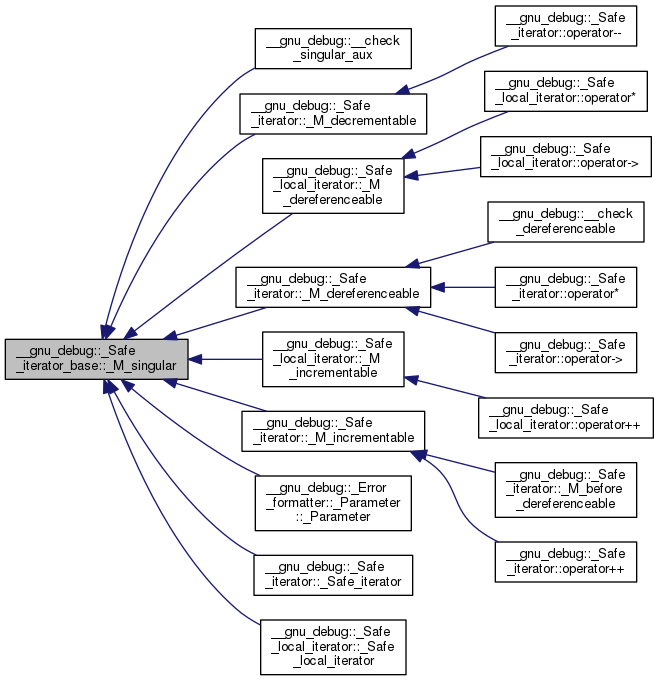
|
inlineinherited | |||||||||||||
Unlink itself.
References __gnu_debug::_Safe_iterator_base::_M_next, and __gnu_debug::_Safe_iterator_base::_M_prior.
| bool __gnu_debug::_Safe_iterator< _Iterator, _Sequence >::_M_valid_range | ( | const _Safe_iterator< _Iterator, _Sequence > & | __rhs | ) | const |
|
inline |
Return the underlying iterator.
Referenced by __gnu_debug::_Safe_iterator< _Iterator, _Sequence >::_M_before_dereferenceable(), __gnu_debug::_Safe_iterator< _Iterator, _Sequence >::_M_is_begin(), __gnu_debug::_Safe_iterator< _Iterator, _Sequence >::_M_is_end(), __gnu_debug::_BeforeBeginHelper< _Sequence >::_S_Is_Beginnest(), __gnu_debug::_Safe_iterator< _Iterator, _Sequence >::operator*(), __gnu_debug::_Safe_iterator< _Iterator, _Sequence >::operator+(), __gnu_debug::_Safe_iterator< _Iterator, _Sequence >::operator++(), __gnu_debug::_Safe_iterator< _Iterator, _Sequence >::operator+=(), __gnu_debug::_Safe_iterator< _Iterator, _Sequence >::operator-(), __gnu_debug::_Safe_iterator< _Iterator, _Sequence >::operator--(), __gnu_debug::_Safe_iterator< _Iterator, _Sequence >::operator-=(), __gnu_debug::_Safe_iterator< _Iterator, _Sequence >::operator->(), __gnu_debug::_Safe_iterator< _Iterator, _Sequence >::operator=(), and __gnu_debug::_Safe_iterator< _Iterator, _Sequence >::operator[]().

|
inline |
|
inline |
Conversion to underlying non-debug iterator to allow better interaction with non-debug containers.
|
inline |
Iterator dereference.
References __gnu_debug::__msg_bad_deref, _GLIBCXX_DEBUG_VERIFY, __gnu_debug::_Safe_iterator< _Iterator, _Sequence >::_M_dereferenceable(), and __gnu_debug::_Safe_iterator< _Iterator, _Sequence >::base().

|
inline |
References __gnu_debug::__msg_advance_oob, _GLIBCXX_DEBUG_VERIFY, __gnu_debug::_Safe_iterator< _Iterator, _Sequence >::_M_can_advance(), __gnu_debug::_Safe_iterator_base::_M_sequence, __gnu_debug::_Safe_iterator< _Iterator, _Sequence >::_Safe_iterator(), and __gnu_debug::_Safe_iterator< _Iterator, _Sequence >::base().
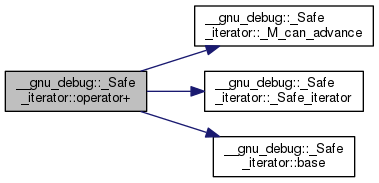
|
inline |
Iterator preincrement.
References __gnu_debug::__msg_bad_inc, _GLIBCXX_DEBUG_VERIFY, __gnu_debug::_Safe_iterator_base::_M_get_mutex(), __gnu_debug::_Safe_iterator< _Iterator, _Sequence >::_M_incrementable(), and __gnu_debug::_Safe_iterator< _Iterator, _Sequence >::base().

|
inline |
Iterator postincrement.
References __gnu_debug::__msg_bad_inc, _GLIBCXX_DEBUG_VERIFY, __gnu_debug::_Safe_iterator_base::_M_get_mutex(), __gnu_debug::_Safe_iterator< _Iterator, _Sequence >::_M_incrementable(), __gnu_debug::_Safe_iterator_base::_M_sequence, __gnu_debug::_Safe_iterator< _Iterator, _Sequence >::_Safe_iterator(), and __gnu_debug::_Safe_iterator< _Iterator, _Sequence >::base().

|
inline |
References __gnu_debug::__msg_advance_oob, _GLIBCXX_DEBUG_VERIFY, __gnu_debug::_Safe_iterator< _Iterator, _Sequence >::_M_can_advance(), __gnu_debug::_Safe_iterator_base::_M_get_mutex(), and __gnu_debug::_Safe_iterator< _Iterator, _Sequence >::base().
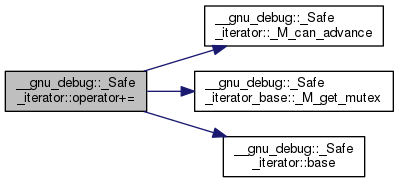
|
inline |
References __gnu_debug::__msg_retreat_oob, _GLIBCXX_DEBUG_VERIFY, __gnu_debug::_Safe_iterator< _Iterator, _Sequence >::_M_can_advance(), __gnu_debug::_Safe_iterator_base::_M_sequence, __gnu_debug::_Safe_iterator< _Iterator, _Sequence >::_Safe_iterator(), and __gnu_debug::_Safe_iterator< _Iterator, _Sequence >::base().
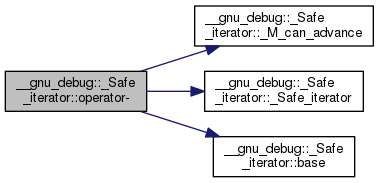
|
inline |
Iterator predecrement.
References __gnu_debug::__msg_bad_dec, _GLIBCXX_DEBUG_VERIFY, __gnu_debug::_Safe_iterator< _Iterator, _Sequence >::_M_decrementable(), __gnu_debug::_Safe_iterator_base::_M_get_mutex(), and __gnu_debug::_Safe_iterator< _Iterator, _Sequence >::base().

|
inline |
Iterator postdecrement.
References __gnu_debug::__msg_bad_dec, _GLIBCXX_DEBUG_VERIFY, __gnu_debug::_Safe_iterator< _Iterator, _Sequence >::_M_decrementable(), __gnu_debug::_Safe_iterator_base::_M_get_mutex(), __gnu_debug::_Safe_iterator_base::_M_sequence, __gnu_debug::_Safe_iterator< _Iterator, _Sequence >::_Safe_iterator(), and __gnu_debug::_Safe_iterator< _Iterator, _Sequence >::base().
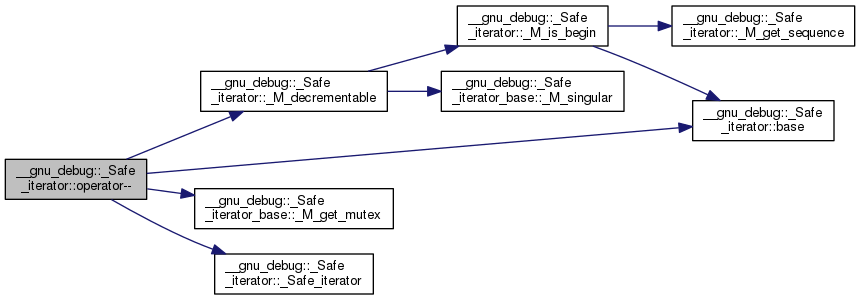
|
inline |
References __gnu_debug::__msg_retreat_oob, _GLIBCXX_DEBUG_VERIFY, __gnu_debug::_Safe_iterator< _Iterator, _Sequence >::_M_can_advance(), __gnu_debug::_Safe_iterator_base::_M_get_mutex(), and __gnu_debug::_Safe_iterator< _Iterator, _Sequence >::base().
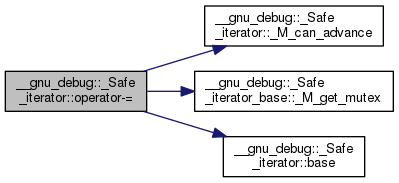
|
inline |
Iterator dereference.
References __gnu_debug::__msg_bad_deref, _GLIBCXX_DEBUG_VERIFY, __gnu_debug::_Safe_iterator< _Iterator, _Sequence >::_M_dereferenceable(), and __gnu_debug::_Safe_iterator< _Iterator, _Sequence >::base().

|
inline |
Copy assignment.
References __gnu_debug::__msg_copy_singular, _GLIBCXX_DEBUG_VERIFY, __gnu_debug::_Safe_iterator< _Iterator, _Sequence >::_M_attach(), __gnu_debug::_Safe_iterator_base::_M_detach(), __gnu_debug::_Safe_iterator_base::_M_get_mutex(), __gnu_debug::_Safe_iterator_base::_M_sequence, __gnu_debug::_Safe_iterator_base::_M_version, and __gnu_debug::_Safe_iterator< _Iterator, _Sequence >::base().
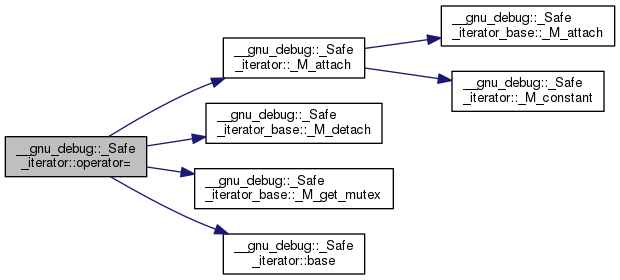
|
inline |
References __gnu_debug::__msg_iter_subscript_oob, _GLIBCXX_DEBUG_VERIFY, __gnu_debug::_Safe_iterator< _Iterator, _Sequence >::_M_can_advance(), and __gnu_debug::_Safe_iterator< _Iterator, _Sequence >::base().

|
inherited |
Pointer to the next iterator in the sequence's list of iterators.
Only valid when _M_sequence != NULL.
Referenced by __gnu_debug::_Safe_iterator_base::_M_unlink().
|
inherited |
Pointer to the previous iterator in the sequence's list of iterators.
Only valid when _M_sequence != NULL.
Referenced by __gnu_debug::_Safe_iterator_base::_M_unlink().
|
inherited |
The sequence this iterator references; may be NULL to indicate a singular iterator.
Referenced by __gnu_debug::_Safe_local_iterator< _Iterator, _Sequence >::_M_get_sequence(), __gnu_debug::_Safe_iterator< _Iterator, _Sequence >::_M_get_sequence(), __gnu_debug::_Safe_iterator_base::_Safe_iterator_base(), __gnu_debug::_Safe_local_iterator_base::_Safe_local_iterator_base(), __gnu_debug::_Safe_iterator< _Iterator, _Sequence >::operator+(), __gnu_debug::_Safe_local_iterator< _Iterator, _Sequence >::operator++(), __gnu_debug::_Safe_iterator< _Iterator, _Sequence >::operator++(), __gnu_debug::_Safe_iterator< _Iterator, _Sequence >::operator-(), __gnu_debug::_Safe_iterator< _Iterator, _Sequence >::operator--(), __gnu_debug::_Safe_local_iterator< _Iterator, _Sequence >::operator=(), and __gnu_debug::_Safe_iterator< _Iterator, _Sequence >::operator=().
|
inherited |
The version number of this iterator.
The sentinel value 0 is used to indicate an invalidated iterator (i.e., one that is singular because of an operation on the container). This version number must equal the version number in the sequence referenced by _M_sequence for the iterator to be non-singular.
Referenced by __gnu_debug::_Safe_local_iterator< _Iterator, _Sequence >::operator=(), and __gnu_debug::_Safe_iterator< _Iterator, _Sequence >::operator=().